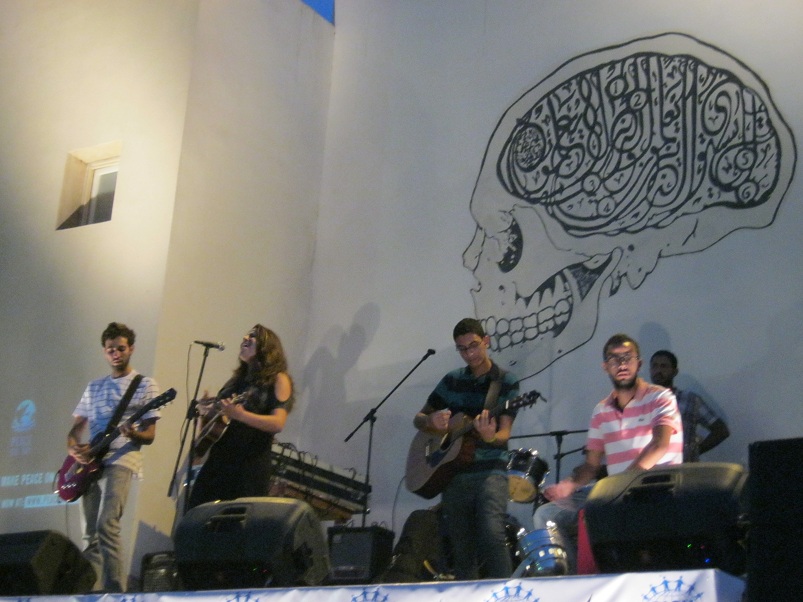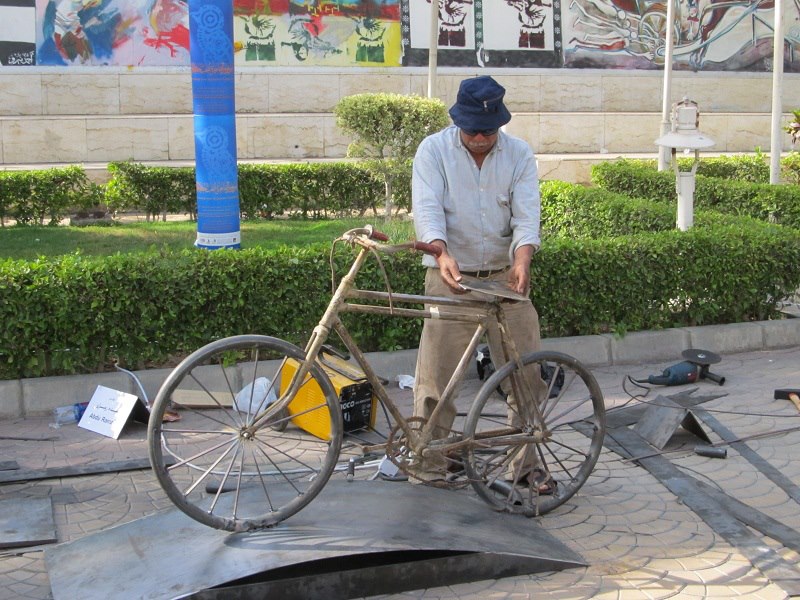By Lily Grimes
Earning something you desire increases its value, and so it was with Voice of the Streets, a free event showcasing rappers from Lebanon, Jordan, Palestine, Tunisia, Libya and Egypt. A motley crew of about 80 people huddled outside the gates to the Gezira Youth Center in Zamalek last Friday waiting to be let in. Occasional updates from the organizers informed us it would be starting shortly but after an hour it was looking like it might fizzle out.
Some drifted off after an hour and a half but the appearance of celebrated rapper Malikah from Lebanon at the firmly locked gates gave everyone a feeling of hope.
The event was originally scheduled to take place at the youth center, but organizers had to change the venue at the last minute to Darb 1718. One of the organizers is a photographer who invited protesters injured during the revolution to the show. The youth center officials were reportedly worried that their presence may cause a problem, but at the same time, did not want the organizers to cancel the show since that would give the center a bad rap, a source told Daily News Egypt. Eventually, organizers managed to change venue at the last minute after security officials said it could not go through at the youth center.
During the wait, anyone who hadn’t come with friends had by now made new ones, and so it was our band of hip hop brothers made its way to Mar Girgis. Turning the metro into an ad hoc beat-box and freestyle performance was definitely a highlight of the evening.
Rounding a corner to the beautiful Darb 1718 was like discovering the Green Fields at Glastonbury. The venue was perfect with a rooftop stage, wide dance floor on the street below and a grassy chill out area covered in giant orange bean bags. Nobody was missing the Gezira Youth Center at that point.
The sound system didn’t quite stand up to the battering it got from vehement MCs spitting quality lyrics at rat-a-tat pace but a touch of distortion was fitting for this on-the-fly musical adventure. The stage with its eerie green light framed the performers perfectly, a pulpit from which to speak to avid fans hungry for lyrics.
Egypt’s MC Amin opened the show with a crowd-pleasing set that filled the dance floor and got the younger fans singing along. He was joined by Malikah and the pair tripped off each other effortlessly.
Malikah’s air miles must be through the roof; fresh back from a festival in Colombia, her evident tiredness fell away as she grabbed the mic and attacked the beats with her signature bouncing energy.
She was more than a match for Amin and her compatriot Edd (of Fareeq El-Atrash). The trio worked well together; Amin’s words flowing sweetly through thumping breathy verses from Edd, all set off by Malikah’s tumbling flow that gripped the audience, taking them on an aural tour of Beirut.
Egypt’s MC Deeb, one of the organisers of the event, crossed over with Edd, taking the baton and giving us something to really get down to. Smooth flow and catchy rhyming showed off his experience and skill on the mic; a true performer who rides the words.
Deeb told Daily News Egypt that hip hop started in Egypt around 2005 but was commercial and pop influenced, steering clear of social and political issues.
Now ‘’people have a need for songs with meaning, songs that reflect their daily lives.’’ Pop is no vehicle for these kind of discussions, ‘’hip hop was invented as a language against oppression, discrimination, struggle,’’ he says.
‘’Egyptians love punch-lines; they like play on words — we call it affaya,” he said.
Deeb is inspired by Egyptian poets like Salah Jaheen, credited as one of the fathers of Egyptian colloquial poetry, who, he says, writes like an MC. ‘’We’re ready for it because we appreciate the poetry and the words and the imagery and you put a beat with an Arabic sample and that’s it — it works.’’
Deeb was impressed with the turnout; some 200 hip hop fans from hoodied students to Crip-alike.
‘’We were just experimenting, seeing how people would react when we present them with the Arab hip hop scene from Jordan, Palestine, Lebanon, Egypt. I think there’s going to be demand for more — all these guys are going to be talking about this show.’’
Regionally, Egypt is a poor cousin when it comes to hip hop; Lebanese heavyweights like Malikah cast a long shadow. The scene needs development but the ground is just as fertile here as it is across the region. The Jan. 25 Revolution may well have boosted its popularity, struggle being its raison d’etre.
Malikah sees hip hop as a powerful weapon that made a significant contribution to the Arab Spring. ‘’We educated people, we made them realize that you can actually make a change,” she told DNE. “You don’t have to live like that, you can have your voice heard.’’
‘’When you listen to a hip hop track, it should either make you think or you should learn something or it should make you change your mind.’’
El Far3i gave us plenty to think about on stage. His style is a little rawer, but his slightly abrasive approach was seductive. Despite lingual differences we were with him.
The Jordanian rapper was impressed with what he saw that night. Like most performers, he hadn’t seen the underground Egyptian hip hop scene in action. He blamed it on lack of access to what is actually going on here.
“There are masses of Egyptian hip hop [aficionados],” El Far3i said. “I’m talking about fans and guys who rap freestyle really well with their own. They know what it is, they know what they’re doing, it’s their style and they’re doing it.’’
Hip hop provides a space to communicate and that, he argues, is the main reason it has taken off in the Arab world. He says people here who aren’t attracted to the musical genre still relate to the sense of being articulated. And inevitably, the discussion turns to Arabic poetry; fusha is naturally melodic and rapping in old Arabic is only a beat away from Arabic poetry.
After his solo set, El Far3i bounced off one of Palestine’s finest, Boikutt. The latter gave it guttural sound but his flow was flawless, packing in the lyrics.
Arabian Knights finished the event as it started; bookending with hands-in-the-air familiar favorites.
Hip-hoppers will hope this is not just a one-off. There was certainly enough to inspire future events, but funding is surely a major concern.
Heroic organizational efforts partnered by seriously dedicated fans and a wealth of hardcore talent made it one of the best nights this writer has had in this kicking city. Keep the hip hop fresh, Cairo.

Palestinian rapper Boikutt.

Egyptian rapper Deeb.


